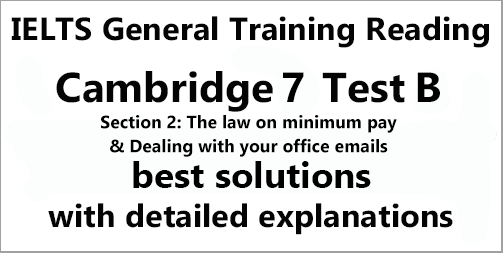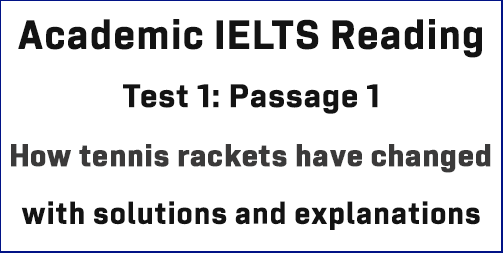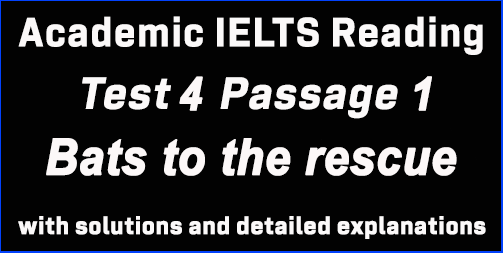IELTS General Training Reading: Cambridge 7 Test B Section 2; The law on minimum pay & Dealing with your office emails; with best solutions and best explanations
This General Training IELTS Reading post deals with a solution package for IELTS Cambridge 7 Reading Test B Section 2 that has two texts entitled ‘The law on minimum pay‘ and ‘Dealing with your office emails‘. This is an aimed post for candidates who have major problems searching for and understanding Reading Answers. This post can guide you the best to understand every Reading answer easily and without much difficulty. Finding IELTS Reading answers is a step-by-step process, and I can confidently say that this post will help you in this respect.
IELTS Cambridge 7 Test B: GT Reading Module
Section 2: Questions 15-27
Questions 15-21: Completing sentences (NO MORE THAN TWO WORDS AND/OR A NUMBER)
[In this kind of question candidates have to fill in the gaps, only with some conditions like NO MORE THAN THREE/TWO WORDS and/or A NUMBER or, ONE WORD ONLY. Each question has keywords that will lead to the answer. This question type generally follows a sequence.]
Title of the text: The law on minimum pay
Question 15: The law on minimum pay doesn’t cover you if you are working in your ________ or if you are a volunteer.
Keywords for this question: law, minimum pay, doesn’t cover you, if, working, volunteer,
The answer is in the first section ‘Who is entitled to minimum pay?’. Here, lines 2-3 say, “Amongst those to whom it does not apply are those engaged in unpaid work and family members employed by the family business.”
Here, does not apply = the law on minimum pay doesn’t cover, engaged in unpaid work = volunteer,
So, the answer is: family business
Question 16: You may be paid under £5 an hour if you are receiving _________ at the start of a job.
Keywords for this question: may be paid, under £5 an hour, receiving, start of a job,
The answer can be found in the second section of the text named ‘What is the minimum wage that I am entitled to?’. Here, in lines 3-4, the writer says, “ . .. . . The development rate for 18-21 year olds and for workers getting training in the first 6 months of a job is £4.60 per hour.”
Here, getting = receiving, £4.60 per hour = under £5 an hour,
So, the answer is: training
Question 17: There are different rules for people who are provided with ________ with their jobs.
Keywords for this question: different rules, provided with, with their jobs,
The answer is in the second section of the text named ‘What is the minimum wage that I am entitled to?, in lines 5-6. The author says here, “ .. . . There are special provisions for some workers, for example, those whose job includes accommodation.”
Here, special provisions = different rules, job includes = with their jobs,
So, the answer is: accommodation
Question 18: If you earn extra money, for example for working longer hours or in tips, this counts as part of your wage when you receive it via ___________.
Keywords for this question: earn extra money, working longer hours, in tips, counts as part of, wage, when, receive it via,
The answer is in the second section of the text entitled ‘What is the minimum wage that I am entitled to?, in lines 6-8. The author says here, “ .. . . Pay means gross pay and includes any items paid through the payroll such as overtime, bonus payments, commission and tips and gratuities.”
Here, overtime = working longer hours, paid through = receive it via,
So, the answer is: (the) payroll
Question 19: Anyone being paid below the National Minimum Wage should speak to their _______ if they can.
Keywords for this question: paid below, the National Minimum Wage, should speak, if they can,
The answer is in the third section of the text which has a long title: ‘I believe I’m being paid below the National Minimum Wage Rate. How can I complain?’, in paragraph no. 1 bullet point 1,
“If you are being paid less than this, there are various steps you can take:
- If you feel able, you should talk directly with your employer. This is a clear legal right, and employers can be fined for not paying the NMW.”
Here, being paid less than this = paid below the NMW,
So, the answer is: employer(s)
Question 20: According to the law, you can ask to look at your boss’s ________.
Keywords for this question: According …. law, can ask to look at, your boss’s,
The answer is in the third section of the text which has a long title: ‘I believe I’m being paid below the National Minimum Wage Rate. How can I complain?’, in paragraph no. 2. Here, in the first lines, the writer says, “You have the legal right to inspect your employer’s pay records if you believe, on reasonable grounds, that you are being paid less than the NMW.”
Here, legal right = according to the law, to inspect = to look at, employer’s = boss’s,
So, the answer is: pay records
Question 21: You have a period of _________ to complain if your boss does not co-operate within the specified period of time.
Keywords for this question: period of, to complain, if, boss does not co-operate, within, specified period of time,
Again, the answer is in the third section of the text which has a long title: ‘I believe I’m being paid below the National Minimum Wage Rate. How can I complain?’, in paragraph no. 2. In the very last lines, the author says, “. … . If your employer fails to produce the records, you may take the matter to an employment tribunal. You must make your complaint within three months of the ending of the 14-day notice period.”
Here, employer fails to produce the records = boss does not co-operate, must make your complaint = have a period .. . .. to complain,
So, the answer is: 3/three months
Questions 22-27: (Completing FLOW-CHART with NO MORE THAN TWO WORDS):
In this type of question, candidates are asked to write NO MORE THAN TWO WORDS to complete some notes on the given flow-chart. For this type of question, first, skim the passage to find the keywords in the paragraph concerned with the answer, and then scan to find the exact word.
[TIPS: Here, scanning technique will come in handy. Target the keywords of the questions to find the answers. Remember to focus on Proper nouns, random Capital letters, numbers, special characters of text etc.]
The headline of the text: Dealing with your office emails
The headline of the question: Dealing with emails
Question 22: Delete __________
Keywords for this question: Delete,
In the section named ‘Prioritising incoming messages’, lines 2-3 say, “. .. If it is obvious spam, it can be deleted without reading.”
So, the answer is: (obvious) spam
Question 23:
Sort email according to the:
- sender
- subject
- ___________
Keywords for this question: sort email, according to, sender, subject,
In the section named ‘Prioritising incoming messages’, check all the bullet points. The first two bullet points talk about ‘sender’ and ‘subject’.
Then in the third bullet point, the writer says,
- Has the email been in your inbox for long? Check the message time.
So, the answer is: message time
Question 24: Deal with emails that need your ________.
Keywords for this question: Deal with emails, need,
In the section ‘Prioritising incoming messages’, check the last lines, where the writer says, “An initial scan like this can help you identify the emails that require your prompt attention.”
Here, identify the emails = deal with emails, require = need,
So, the answer is: prompt attention
Question 25: If an email is easy to deal with, you should __________.
Keywords for this question: if email, easy to deal with, should,
The answer can be found in the section named ‘Replying in stages’, in the second paragraph, the writer says in lines 1-2, “Some emails are uncomplicated and only require a brief, one line answer, so it’s a good idea to reply to these immediately.”
Here, uncomplicated and only require a brief, one line answer = easy to deal with,
So, the answer is: reply immediately
Question 26 and 27:
If an email is complex, you can:
- first send a ________
- give the sender a _________ for answering their email fully
Keywords for this answer: email, complex, first send, give, sender, for answering, email fully,
The answers to these questions can also be found in section no. 3 named ‘Replying in stages’. Here, the author says, “Having prioritised your emails, you can answer them in stages, first with a brief acknowledgement and then a more detailed follow-up. This is particularly advisable when dealing with complicated matters where you don’t want to give a rushed answer. If you decide to do this, tell the recipient a definite date when you’ll be able to get back to him or her and try to keep to this wherever possible.”
Here, answer them in stages, first = first send, dealing with complicated matters = complex, don’t want to give a rushed answer = answering their email fully,
So, the answers are:
- brief acknowledgement
- (definite) date
Click here for solutions to Cambridge 7 Test B GT Reading Section 1
Click here for solutions to Cambridge 7 Test B GT Reading Section 3




Best explanation that I have never seen in any site expect this one…no wrds
Thank you.